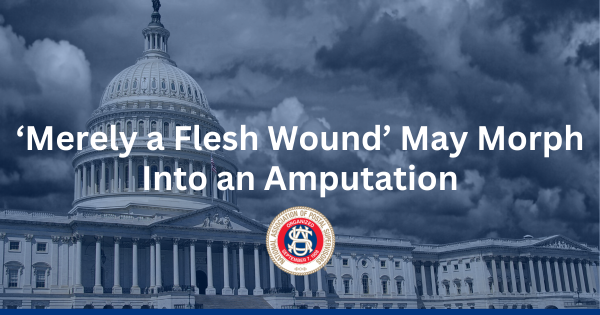‘Merely a Flesh Wound' May Morph Into an Amputation
‘Merely a Flesh Wound’ May Morph Into an Amputation
By Bob Levi
NAPS Director of Legislative & Political Affairs
During a series of pauses in the April 30 House Oversight and Accountability meeting—at which the committee adopted a series of postal and federal employee cuts intended to help offset $5 trillion in corporate and high-income tax reductions and increased funding for border security and the military—I took the opportunity to enlighten the committee’s leadership of budget reconciliation act history. This was from personal experience regarding the Budget Reconciliation Act of 1990.
At the time, I was on the staff of the House Post Office and Civil Service Committee. I confirmed my recollection of events with a then-committee colleague who, like me, now represents members of the federal workforce. I reminisced about how, in 1990, the committee’s forerunner, the House Post Office and Civil Service Committee, stood up to the House Budget Committee and House leadership in rejecting reconciliation instructions to cut postal and federal employee benefits. I mused that our nation’s postal supervisors, managers and postmasters were seeking heroes, such as those from past congresses, to preserve their earned benefits. As you know, the current House Committee approved the cuts by a one-vote majority (22-21) and is intended to be part of the 2025 Budget Reconciliation Act. (As this column went to print, the bill had yet to be assigned a number.) In general, the committee-approved legislation would raise retirement contributions and reduce earned benefits in several ways.
These cuts should not to be surprising as they were referenced in my columns dating back to the beginning of the year and highlighted in my summary of the House Budget Resolution, H.Con.Res. 14. I know many of you who have contacted members of Congress about the Budget Resolution have received a terse response that the resolution was merely a “blueprint.” This retort reminds me of the line in the movie “Monty Python and the Holy Grail” where King Arthur dismembers the Black Knight, yet the knight continues to taunt the king, claiming his injuries are “merely a flesh wound.” Let me remind you that the budget resolution was not merely a blueprint and the benefit cuts are not merely a flesh wound. First, the committee-approved legislation would increase the FERS employee contribution to 4.4% for postal and federal employees hired prior to 2014. This increase translates to a cut in take-home pay of 3.7% for employees hired prior to 2013 and a pay cut of 1.3% for those hired in 2013. Employees hired in 2014 and thereafter already pay 4.4%. Second, the legislation would reduce the annuities of employees retiring in 2027 and thereafter by revising the Civil Service Retirement System (CSRS) and Federal Employees Retirement System (FERS) to base the calculation on the highest-5 consecutive salaried years, rather than the highest-3 years.
Finally, the committee-passed measure would eliminate the FERS Annuity Supplement on the bill’s enactment into law for future retirees. The annuity supplement provides a financial safety net for FERS employees who retire before age 62, the age of Social Security eligibility. It should be noted that, while all the voting Democratic members of the committee opposed the legislation, the only Republican who voted against the legislation was Rep. Michael Turner of Ohio. In voting no, Turner declared, “I don’t believe it represents Republican values or American values.” He went on, “I believe making changes to pension benefits in the middle of employment is wrong. Employee benefits are not a gift; they are earned.” This brings me back to where I began this column. In 1990, Democrats held the majorities of the House and Senate; Republican George H.W. Bush was president. There was a bipartisan consensus to reduce the budget deficit. So, the House Budget Committee, under the chairmanship of Leon Panetta (D-CA), crafted reconciliation instructions to several House committees to reduce programs under their respective jurisdictions. The Budget Committee tasked the House Post Office and Civil Service Committee with coming up with budget reductions that impacted postal and federal employees and retirees and the U.S. Postal Service. In mid-October 1990, under the leadership of Postal and Civil Service Committee Chair William Ford (D-MI) and Ranking Republican Benjamin Gilman (R-NY), the committee voted unanimously to reject the budget reconciliation instructions.
I believe Ford’s and Gilman’s leadership in standing up for the postal and federal workforce resulted in a 1990 reconciliation act less harmful to the postal and federal community than originally proposed. So, during pauses in the Oversight and Accountability Committee’s reconciliation deliberations, I shared my recollection of that event of 35 years ago with Chairman James Comer (R-KY) and Acting Ranking Democrat Stephen Lynch (D-MA). I respectfully asked if it was possible for history to repeat itself. I got my answer at the conclusion of the six-hour long meeting.
Nevertheless, NAPS members, as part of a broad postal and federal coalition, must continue to fight reconciliation cuts; NAPS has made it easy to do so. Just go to page 23 and use the QR code to connect with your member of Congress. While the target date for House consideration is before Memorial Day, there is doubt the House can meet that target. The target notwithstanding, the fight on Capitol Hill will continue through the summer. So, use the NAPS advocacy tool to fight to protect your benefits.
